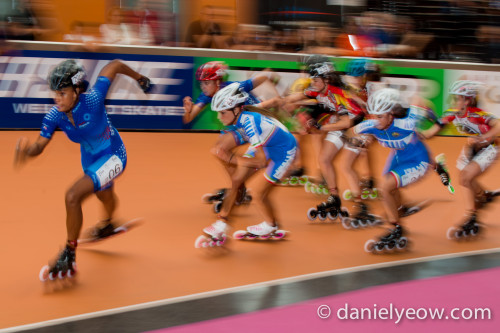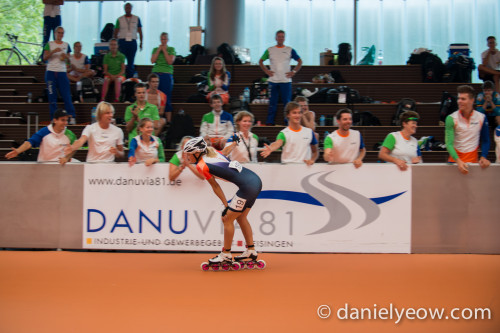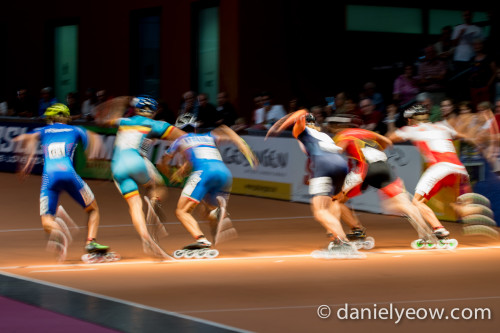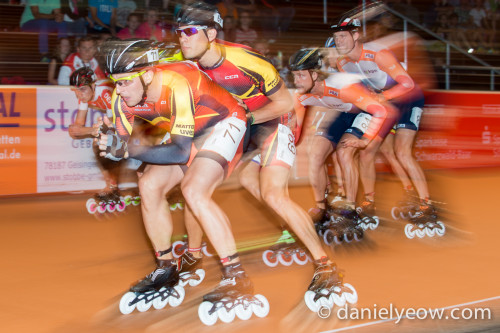Inline Euros 2014 – Day 3
Today saw the conclusion of the track portion of the competition with the 1000m races and the relays. I know I said that points elimination races are some of the most painful things you can do on a pair of skates, but 1000m are arguably a little worse. This is mostly down to the way that they are raced.
At a major championships, there are usually enough skaters such that there will be at least quarter finals, semi finals, and finals… and often even more rounds. In the 500m, typically the first two in each race go through to the next round, however in the 1000m it is usually the first place as well as the next fastest times. This makes it somewhat easier to organise the rounds (the number of heats doesn’t have to be a power of two) but it makes the races more physically taxing. When times are involved, it basically means that the last place getter in a race can potentially qualify for the next round so long as the time is faster than all the other second place getters in the other heats. This causes all of the rounds except for the final itself to take place at a very high speed. (and sometimes the final does anyway)
Therefore, to stand the best chance of winning the distance, a skater has to be both very strong, and very fast. Strong so they can get through all the rounds without running out of energy, but fast because… well… this is speed skating. It also helps to be smart, since the 1000m is long enough that a small amount of strategy can go a long way. For example in the senior men’s final, Bart Swings, current world champion in the distance, managed to outfox everyone and make his move to the front coincide very well with some very hesitant passing by the French and Italian skaters. So hesitant that Livio Wegner from Switzerland took advantage and slipped into second place behind Swings, with 500m champion Gwandal Le Pivert of France in third. In the senior ladies, it was Manon Kamminga of the Netherlands who timed her run to the finish perfectly to take the win over Italy’s Erika Zanetti, which was nice to see since she was disqualified from the 500m and then had to sit out the 15k.
The relays are always exciting. Back when I skated world championships, the length of the relay was 10,000m which was, even when divided amongst three skaters, quite a long way to skate. Over the years, skating’s governing body, in an effort to make the sport more appealing for television, has lowered the length to 3km on track. With three skaters continually changing, each skating a total of 1000m at what is essentially a 1:2 interval (1 lap on, 2 laps off), the speed of the average relay is right up there at “ludicrous”. Add to that the chaos of having to make clean relay changes in a pack, skating at top speed, and what you’re left with is basically beautiful chaos.
And chaos it was! There were many falls and disqualifications. It’s very easy to get disqualified because when two large packs of skaters converge to give each other relay tags, it can sometimes happen that you miss the other skater from your team entirely. Falls and disqualifications notwithstanding, even a poorly-timed relay change can quickly see you going from first to last in a matter of a few meters. The senior ladies relay was won by a spirited performance and a well-timed move by Germany, while the senior men saw Italy disqualified and France mess up a change (two of the strongest teams) to see Belgium, led by Bart Swings, win over Germany and the Netherlands.
As usual full results from the track competition can be found here.
Don’t forget to check out the photo page.





Leave a comment